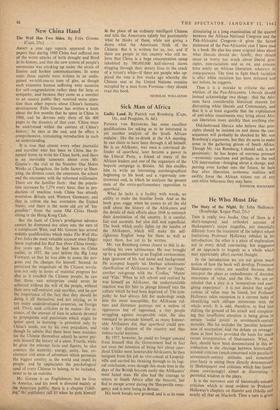New China Hand
The Wall Has Two Sides. By Felix Greene.
• (Cape, 25s.)
ABOUT a year ago reports appeared in the papers that during 1960 China had suffered one of the worst attacks of both drought and flood in its history, and that the new system of people's communes was cracking up under the strain of famine and broken communications. In some cases those reports were written in an undis- guised we-told-you-so tone of glee, as though such extensive human suffering were occasion for self-congratulation rather than for help or sympathy, and because they came as a comfort to an uneasy public they received more atten- tion than other reports about China's fantastic development. Felix Greene has written a book about the five months that he spent in China in 1960, and he devotes only three of his 400 pages to the disasters of that year. 'China must be understood within the context of China's history,' he says at the end, and he offers a comprehensive, stimulating introduction to such an understanding.
It is true that almost every other journalist and traveller who has been to China has re- turned home to write his China book, and there is an inevitable sameness about even Mr. Greene's—the visit to the Number One Motor Works at Changchun, the lathe factory at Shen- yang, the divorce court, the commune, the school and the encounter with the reformed millionaire. There are the familiar facts: that the popula- tion increases by 1,574 every hour, that in pro- cluctiOn".- of machine tools China has already overtaken Britain and Western Germany, and that in cotton she has overtaken the United States; and there is the same old cry of 'Im- possible!' from the same Old China Hands sitting in the Hong Kong Club.
But the facts of China's prodigious advance cannot be drummed tco often into the ears of a complacent West, and Mr. Greene has several notable qualifications which make The Wall Has Two Sides the most valuable account since Edgar Snow exploded his Red Star Over China twenty- five years ago. •First, he had been to China earlier, in 1957, the year before the Big Leap Forward, so that he was, able to assess the pro- gress and the changes for himself. Second, he perceived the magnitude of the Chinese revolu- tion not only in terms of material progress but also as it touched the Chinese people; he saw that those vast enterprises could never be achieved without the will of the people, without their own self-restraint and sacrifice, and he saw the importance of the fact that they should be doing it all themselves and not relying, as in too many underdeveloped countries, on foreign aid. Third, such criticism as he makes—for in- stance, of the amount of time in schools devoted to propaganda and patriotism which might be [setter spent in learning—is provoked only by China's needs, not by his own prejudices, and though he admits that there have been mistakes (as the Chinese themselves admit) he never per- mits himself the luxury of a sneer. Fourth, while he gives the relevant facts and figures, he also conveys the austerity, energy, unity, fun, ex- citement and sense of adventure which permeate the biggest country in the world and impel its people; and he appreciates the psychological treed of every Chinese to belong, to be included, never to be an outsider.
Mr. Greene is an Englishman, but he lives in America, and his book is directed mainly at the American public; there is a chapter ('chill- ing,' the publishers call it) when he puts himself in the place of an ordinary intelligent Chinese and tells the Americans calmly but passionately what he thinks of them, while not giving a damn what the Americans think of the Chinese. But it is written for us, too, and if there are people in this country who still be- lieve that China is a huge concentration camp inhabited by 700,000,000 half-starved slaves slogging through their dreary lives to the crack of a tyrant's whip—if there are people who ap- plaud the vote a few weeks ago whereby the Chinese seat at the United Nations remains occupied by a man from Formosa—they should read this book.
NICHOLAS WOLLASTON






























 Previous page
Previous page